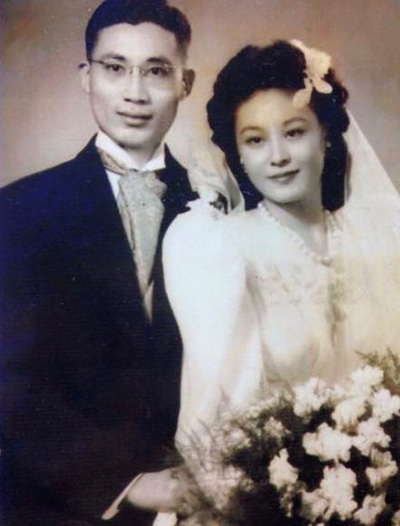Alzheimer's disease does not announce its arrival but develops gradually in life: A Chinese daughter's caregiving journey with her mother_Part 1

My English name is Andree Guo. I came from Shanghai and have been living with my mom since then. I came here in 1990 and have been living with my mom for many years. Around 2000, I noticed that my mom’s behavior and speech were a little weird, different from before. At that time, I didn't know about Alzheimer's disease, so I asked some friends. Some of them were doctors. They told me to pay attention to my mom and spend more time by her side. At that time, my mother had just retired, and in 2002 we felt that we should consult a doctor. It happened that my mom’s family doctor, Dr. Liao, was a geriatric specialist. He was familiar with these diseases. He said because of my poor health—I had high blood pressure and severe rheumatoid arthritis, my blood sugar level was high, both my knees were deformed resulting in walking difficulty, and my husband has heart disease and high blood pressure–it was really inconvenient for people like us to take care of the elderly. Actually, my daughter was there with us, he told my daughter to pay more attention to my health.
The doctor later recommended us to enroll my mother at the senior day care center. He said that we don’t have to worry when we will be at work during the day. During the day, my mother went to the day care center, and the doctor also did an evaluation with me during the visit, and found that I had depression. Because I have been worrying. In 2002, the Bay Area was experiencing economy downturn, my husband returned to Shanghai to find a job, I was here taking care of my mother all by myself. I was really stressful. Every day when I was driving, I would contemplate if I died in a car accident on the freeway, everything would come to an end, and I wouldn’t have to worry about any trouble anymore. When I was at work, I couldn’t help but tears streamed down, and my colleagues cared about me a lot. Later they said to me, “Tell us something about what happened between you and your mom when you come to work every day, you will be relieved when you share your heart.” It was around this time I met Peining Chang (Alzheimer’s Association) at the day care center. Peining conducted classes at the center once every month for the family members, everyone can share how they were inwardly depressed and troubled. With that, I got to know more about Alzheimer's disease. What I learned then was very useful, until 2015, when my mother passed away due to serious illness. The volunteers at the day care center said my mom really loved to go there. Through her learning, some of her behaviors became more rational than before. Later on, she told others, "My daughter is best taking care of me. I like her the most." Hearing that, I was very much consoled. Over there, my mom would paint and play mahjong. Her painting was even auctioned for $240 at an Alzheimer Association event. She was so happy. Since my mom studied in France, and her grandma was French, her French was even better than her English. She also helped interpret when French-speaking people visited the center. When she was at the day care center, I felt like I was a parent of a kindergartener. I was very happy that my mom seemed to be making progress there. My mom was the eldest daughter in her family, so she liked to boss around. She liked to boss around over there, too. My mom knew how to take charge, got them to eat, and woke them up to sing as people dozed off in class. I had so much joy then. I always took my mom to Peining's class, so Peining knew my mother very well.
My mom took a quick turn from seriously ill to passing away. At that time, my husband was suffering from severe heart disease and underwent surgery, thus, I had a heavy load taking care of two persons in that period of time. At that time, my mom was living in an apartment. When another elderly who lived there passed away, my mom felt that it would be her turn soon. I learned that only when the other residents in the apartment told me. Since then, I was prompted to promote these to more people. I felt in the society nowadays, children have no idea their parents would become this way in the future, and people of my age do not expect they might be like this in the future. This disease does not announce its arrival but develops gradually in life. Once diagnosed, one must take medicine. At some point, my mother thought she could manage her medication intake, and she was able to call for refill, only found out later that she hadn't had her medication for a long time already. She was very upset that I checked on her stuff, but when I checked, I said no way, she was very sick, and she would hide food in her clothes, fill the pots with water and lay them all around in the kitchen. After she started her medication, I am not saying her condition improved, but her behavior changed for the better, felt more relaxed, and slept better at night. I think everyone in our society should be aware of this disease, so I took classes at the Alzheimer's Association, and now I am one of the instructors, I also participated in an advocacy activity in Sacramento earlier this year.
During those days, I attended classes with my mom and get to know many members’ family, I also learned a lot. In the meantime, I also had my rheumatoid arthritis surgery, I attended more classes when I got better. Encourage everyone to take classes, they are all online now. Like I learned that during the initial discovery, families with more children sometimes have family disputes, especially some of the siblings live in other states, they would argue over providing care, as if they are evading their responsibility, as a result, there were frequent communication. In addition, the elderly’s appetite might change, or they refused to eat, resulting in malnutrition. It is important to know how to make something that is easier for the elderly to digest.
You know, the elders used to call dementia as mentally deficiency, so many families rejected that and refused to let outsiders know or admit it. They considered that these naturally happen in aging and would not name it a disease. Therefore, it is very difficult to correct the elderly’s mindset, hence, if you want to study, you should solicit help from the young people, or the seniors’ children.
We did apply to the government to have someone go to her home to take care of her breakfast. And I would go to see my mom after work, sometimes I would bring something with me. My mom chose the caregiver herself, they were a couple, they would also take my mom out to eat. During weekends, my sister and I would take my mom home and take care of her. That allowed my mom to interact with others more and to engage in more activities. The doctor suggested to let her participate in some group activities when I am off to work.
Indeed, there are many other challenges in providing care. We have a persimmon tree at our house. My mom would pick the nice and big persimmons and hide them. One day I found out she dumped a bag of clothes in the trash with rotten persimmons inside, because she had forgotten about them. There was also problem with taking medicine. I really had to remind her, otherwise she would hide it, so we have to know the places she likes to hide things. And about the kitchenware, I had to hide the control, because she was forgetful and would leave the stove on. We usually only let her use the microwave.
In 2009, I joined the annual meeting hosted by Peining, and I shared some of my experiences. When it was over, many among the audience came to share with me that they had exactly the same situation in their families, and some even embraced me and cried, and I wanted to cry too. Actually, many stories are very similar. When my mom started to display symptoms, my brother and sister felt that I intentionally exaggerated the severity of my mom's condition. Until my brother took a trip with my mom, my mom didn’t take her medicine for many days. Finally, my brother couldn’t stand it when my mom walked to the middle of the road and stayed there. Even my brother tried to lead her away, she did not move and pinched him with her nails. In fact, this was the onset of the disease, but my brother didn’t know. Later, he realized my mother would get up in the middle of the night and knock on the door, demanding to go back home. That’s because he did not manage her medication well, then he realized I wasn’t talking nonsense, and these things did actually happen.
Many people have not come across this disease, so when I promote activities and courses, many people ask a lot of questions, like did they have to pay for the courses. And the fundraising walk, I participated for several years in a row. I had also done that, wheelchairing her along. Some people are afraid that online registration is complicated, so it would be better to simplify the registration process.
Some elderly people don’t know how to search online, sometimes the Chinese web pages shifted to English as they were browsing, or if there were other issues that would hinder them from finding what they were looking for.
